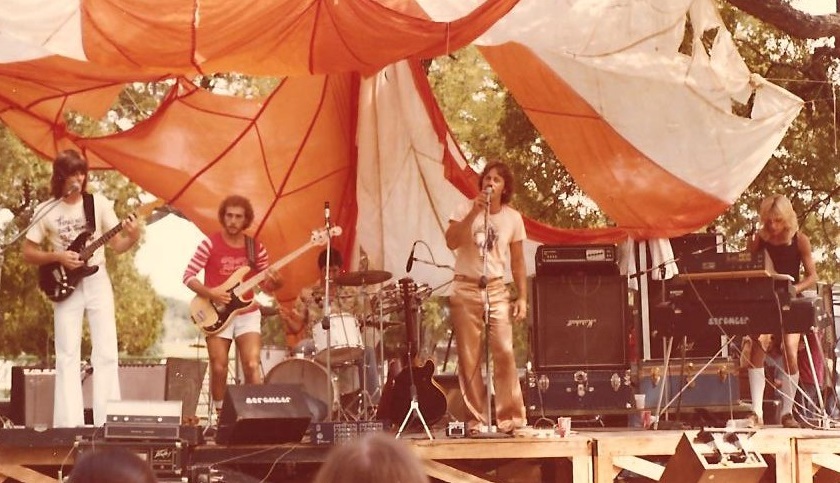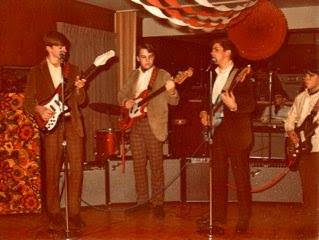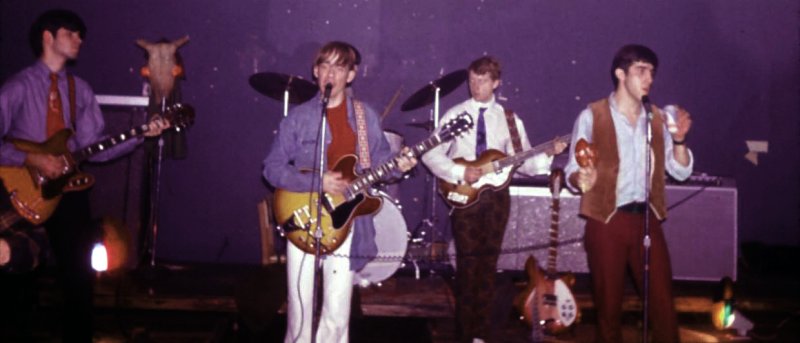Before It Was the Live Music Capital, Austin Was a Garage Band Hotbed
By Megan Dolan
Reporting Texas

Jim Burton, at the microphone, performs with Stranger, a 1970s Austin band. He’s now a maker of custom guitars. Contributed photo
Jim Burton has been in one garage band or another for 50 years. The first was in Burkburnett, a small town in North Texas. The rock cover band was called Sons of American Mothers.
In the 1970s in Austin, Burton played guitar and sang in Stranger. The group played jazz rock; think Gentle Giant or Weather Report. Stranger played in places such as Club Foot downtown and Raul’s, the early punk club near the University of Texas campus.
Now 66, Burton still lives in Austin, partly because he can jam with other sort-of-amateur musicians. “You can’t throw a rock outside and not hit a musician in Austin, because they’re everywhere,” said Burton, who retired from his day job a few years ago to make custom guitars.
Live music has been part of Austin’s DNA for decades, long before the city claimed the title of “live music capital of the world” and hosted giant events such as South by Southwest. In the 1960s and ‘70s, the city was filled with teenage garage bands that played mostly for fun and to be seen as cool. A few flirted with commercial success at a time when Austin’s live music scene was exploding.
Burton still plays with many musicians, including Stranger’s original bassist from high school, and now and then plays parties and bars.
“There’s nothing as exhilarating and as powerful as a full-blown rock band in full swing,” Burton said. ”It’s better than any kind of drug you’ll ever try. That’s why so many people still do it.”
Stephanie Bergara, a program specialist in the city’s Music and Entertainment Division, says there are between 4,000 and 5,000 musicians today who make at least some money playing local venues. There’s no count of amateurs, though. “The number can’t really be quantified, because there are investment bankers who play the drums,” she said.
Stranger split up decades ago as its members moved on to different occupations. One owns an art-framing business. One works for the state. One was a court reporter. One became an aeronautical engineer. The drummer, now deceased, moved to Mississippi and was a millwright.

Starvation Army played at the Texas Governor’s Mansion in the 1960s. Bassist Scotty Sayers, second from left, now works for Austin golf legend Ben Crenshaw. Contributed photo
Scotty Sayers, a 63-year-old sports manager and amateur bassist, belonged to a 1960s garage band that jammed at the Governor’s Mansion and appeared on “The Mike Douglas Show,” a popular television daytime talk show of the time.
Starvation Army’s lead singer was Mark Connally, son of then-Gov. John B. Connally. The band members – all students at Austin High School — did mostly cover rock tunes and played at ice cream stands and youth dances.
“We used to practice down at the Governor’s Mansion, in the dining room,” Sayers said. Later, he said, “Mrs. Connally renovated the gardens outside in the back of the mansion, and there’s a little natural stage back there, and so, in the afternoons, we used to set up and practice out there.”
In 1968, Nellie Connally arranged to have Starvation Army perform when she appeared on the Douglas show.
“Mike Douglas decided he was going to have a week where he brought in governors’ wives from around the country. Gov. Connally’s wife was invited to come, and he said, ‘Who do you want to bring along from Texas?’ She brought us,” Sayers said.
The band even played for then-President Lyndon B. Johnson.
“We did one big party, one of Gov. Connally’s birthdays,” Sayers said. “President Johnson came in for it, and here we go playing our two songs again.”
Starvation Army broke up in 1970. Mark Connally is now in the investment business. The organist is a doctor in Denver. The drummer is an artist living overseas. A guitarist is in the blueprint business. Sayers works for Ben Crenshaw, the legendary Austin golfer.
The band still gigs now and then. “We put the band back together and played our 40th high school reunion. We played our 45th, and we played our 50th,” Sayers said.
Sayers agrees there’s a strong garage band culture in Austin.
“When people watch music and see groups of guys or groups of girls having fun, they think, ‘Well, I could do that.’ In Austin, especially with all the live music venues and things, people know there are opportunities to perform.”

Six Deep, based in Beaumont, released a single, “Girl, It’s Over,” in 1967. The 45 still shows up occasionally on eBay. David Everett, far left, is a sculptor in Austin. Contributed photo
David Everett, 65, is an Austin sculptor, but in the mid-1960s he was lead guitarist in the Beaumont-based garage band Six Deep.
“Sixty-four was when the Beatles hit Ed Sullivan, and suddenly everybody had a garage band,” Everett said. “It was amazing how they came out of the woodwork. From that point on, it just kept getting more and more active – the music scene – and was growing leaps and bounds.”
Six Deep released a rock single in 1967, when Everett was 17 and in high school. The song, “Girl, It’s Over,” still gets attention online.
“It just keeps turning up and turning up,” Everett said. “England, all over Europe, Australia, all over the U.S. and Canada, Japan. We’ve heard from everywhere.”
The 45 single still trades regularly on eBay, he said.
“Mint condition copies of it regularly sell for around $450 to $500,” Everett said. “It’s good to know it still has a life.”
The band broke up after the single. The surviving members, all in Austin, keep in touch and occasionally get together to jam. But they went their own ways professionally. One sells optical equipment, one is in high-tech management, one worked for the state, and another is an accountant. The keyboardist, who was a teacher, is deceased. “Even one of us went on to be a professional pilot,” Everett said.
While the technology is different these days — Six Deep’s single was recorded on an eight-track recorder – the amateur music culture hasn’t changed much. “Other than a change in the sophistication of the equipment, the whole attitude of people playing and the camaraderie of it all seems to me to be very similar,” he said.
Austin now is known for big music events and big names. But there still are plenty of teenage dreamers playing in garage bands.
Michael Esparza, 21, studies English and linguistics at the University of Texas. In 2009, when he was at Westwood High School in Round Rock, he co-founded The Dullshines. He was the principal songwriter, singer and guitarist in the alt-rock band. The group broke up when members dispersed to different colleges.
“I loved being in a band in high school, and it wasn’t just for prototypical high-school band reasons,” Esparza said. “I don’t think anyone was under the impression that we were in there to pick up girls. It was just that being in a room with a couple of people who are on the same page as you, artistically, was really compelling.”
The band released three extended-plays, recording on the fly. “It was very piecemeal,” Esparza said, “all garages or suburban family rooms.”
Esparza now plays with a group called Eeloy. “There’s always some place you can play and practice in Austin,” he said.